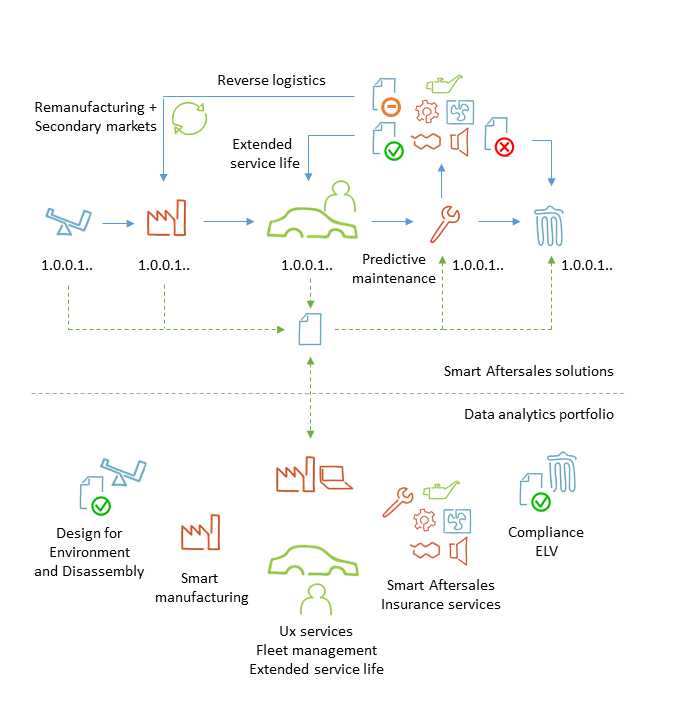Digital solutions for plastics circularity in automotive industry
By Pau Huguet Ferran and Eelco van Ijken
Plastics in the automotive sector
The automotive industry is one of the sectors driving plastic demand and plastic waste generation and, therefore, it does not escape the pressure of a society that asks for greener and more circular products.
While the metal fraction of cars is largely reused and recycled, there are still opportunities to improve the circularity of plastic parts and components, which are not exempt from challenges and difficulties. Many barriers exist for both increasing the recycling rates and the use of secondary feedstock, such as quality and security of supply, technical performance, safety concerns, legal obligations and restrictions, and ultimately economic and environmental impacts. Accordingly, the efforts of the sector are dedicated to preserve the value of the vehicles and components by extending their service life, reducing costs and conserving resources and energy alike.
Mobility as the disruptive trend
The breakthrough of digital technologies and their integration in physical systems are transforming all industries at an unprecedented speed. For the automotive sector, these changes reinforce an industry-wide trend towards integrated mobility concepts that will develop into a number of specific innovations and solutions for smart, user-centred, cleaner and safer vehicles.
Data monitoring and big data analytics offer a large number of opportunities to improve business performance and to generate new business models that will gain access to new market segments and cover future customer needs.
Smart aftersales for Circular Economy
Among them, the application of data analytics for smart aftersales allows the automotive industry to gain competitivity through an improved sustainability performance. Smart aftersales solutions using big data and advanced analytics will allow manufacturers and fleet owners to retrieve information about the vehicle performance and use, enabling smart, fact-based, analyses of the current and future state of the car and its components, and therefore improve predictive maintenance strategies and end-of-life management of vehicles and components. Developments will include the following specific solutions:
- Predictive maintenance to minimise wear and tear, avoid breakdowns, and extend service life of parts and vehicles
- Supply and logistics based on accurate predicted demands
- Fact-based evaluation for revision, recovery and upgrade of components and parts, enabling secondary markets and take back programmes
While being a profitable business area, smart aftersales will also deliver value to society by enabling efficient plastic use and limiting waste generation. Therefore, it will help manufacturers, suppliers, and other stakeholders to address future policy pressure in an efficient and profitable manner, which will also support and reinforce their position across the value chain. Said that, a number of concerns are identified for the spreading of secondary markets and the extension of the service life of plastic parts and components. Uncertainty in the developments regarding the mobility trend in the sector, and how it will enable trusted information flows and value chain cooperation is a potentially limiting factor, as well as safety regulations that may limit the capacity to reuse parts of vehicles. The opportunity is open for innovators and policy makers in order to address the plastic challenge and make it fit into the overall transformation of the automotive industry, which will certainly occur in the next few years.
If you would like to learn more about this, please don‘t hesitate to contact Pau Huguet Ferran.
If you‘re generally interested in the topic of waste prevention and circularity, check this LinkedIn group.



